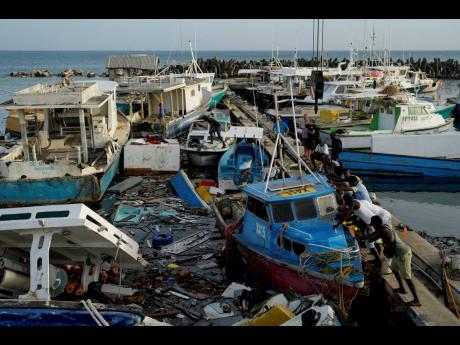Peter Espeut | Reducing our carbon footprint
“The worst moment for the atheist is when he is really thankful and he has no one to thank.” – G.K. Chesterton
Some of us were spared serious damage by powerful Hurricane Beryl, for which we are grateful. People of faith will claim divine intervention and a minor miracle; the others will plead serendipity, fluke and good luck.
Sympathies to those in south St Elizabeth, south Manchester and others, for their loss. Hard-working people will replace lost “things”. Thankfully, “things” are not everything.
I am pleased to hear that almost all the fishers on the Pedro Cays returned to the mainland. In my days as a research scientist I spent several weeks all told on those fragile islands. A good storm surge will wash over those little coral sandspits, and carry away the shacks and anyone in them; good sense eventually prevails with age and maturity.
My fisher-friends at Greenwich Farm did not fare badly; I saw on Tuesday that they had pulled their canoes inland on to the roadway, and so their losses were minor: some of their makeshift gear sheds were destroyed. Since their long-standing base at Greek Pond was destroyed to build the refinery, these fishers have been cotched up against the refinery wall. Surely better can be done for them?
The wind huffed and puffed, but the roof held; and the awnings shivered but stood their ground. My memories of Hurricane Gilbert are still strong: roofless buildings – sheeting strewn everywhere. It seems that we have learned from that old adage: “strapless today, topless tomorrow”. I praise the wisdom of my wife who, last year, had the roof checked and properly secured. A Velia can get the better of a Beryl.
All things considered, it could have been much, much worse.
PERSONAL POWERLESSNESS
Wednesday afternoon as I pondered the force of the wind driving the rain into the concrete wall behind my house, I was aware – not for the first time – of my personal powerlessness. Mother Nature – as well as faith – can move mountains, and we are at the mercy of powers higher than our puny selves.
Carbon dioxide, methane and hydrofluorocarbons – simple gaseous molecules we studied in chemistry lab – are at the root of a lot of our modern troubles; but many of us have never heard of them. Many of us are not aware of how we contribute to the problems of global warming and climate change.
Since the industrial revolution humanity has produced a lot more of these gases (known as “greenhouse gases”), releasing millions of tons of them into the atmosphere every year as if there is no consequence that we will have to suffer. Action leads to reaction; cause leads to effect! The laws of science will get the better of economics and expediency.
Every fire we light (gas stove, kerosene) releases carbon dioxide into the air, and that includes the combustion we ignite in motor car engines, and when we flick on the light switch to use power generated by the burning of bunker-C or natural gas. Every tree we chop down reduces the ability of nature to remove carbon dioxide from the atmosphere and replace it with oxygen. Jamaica once had the highest rate of deforestation in the world; we now do not have enough trees left to earn this accolade.
COWS RELEASE METHANE
Meat-eaters must know that cows release huge amounts of methane from their back-sides into the atmosphere, and methane is more than 28 times as effective as carbon dioxide in trapping heat in the atmosphere. The prosperity caused by the industrial revolution has increased the amount of meat we humans eat, and the climate impact of meat is enormous: roughly equivalent to all the driving and flying of every car, truck and plane in the world! Each of us contributes to global warming in our own way.
Hydrofluorocarbons (HFCs) are potent greenhouse gases that have global warming potentials that range from hundreds to thousands of times that of carbon dioxide. They are the fastest growing greenhouse gases emitted globally by us humans. HFCs are typically found in applications such as refrigeration, air-conditioning, aerosols, and foams. We may not even know whether our fridge, freezer, mattress, insect spray or deodorant contains HFCs.
There are consequences to industrialised development, and a price we have to pay for the convenience of our smartphones, air conditioners and motor vehicles.
And so as we reflect on that fact that the greenhouse gases that we release cause more frequent and stronger hurricanes, let us resolve to reduce our contribution to the problem by reducing the amount of carbon we burn: go solar, or wind power if you can.
Let us plant more trees, and look after them. You can do the math to determine how many trees you need to plant and tend to offset the amount of carbon you burn.
Let us eat less meat.
Let us use refrigerants that are HFC-free.
We cannot control Mother Nature: she is stronger than we are. But we can be more environmentally responsible, and not push things over the brink.
Peter Espeut holds university degrees in the natural sciences, the social sciences, and the queen of sciences. Send feedback to columns@gleanerjm.com

